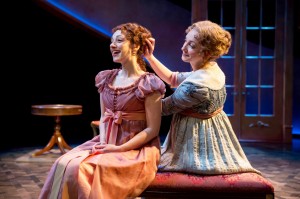PRUDENCE AND PASSION
 Offhand, sense and sensibility hardly seem antonyms. As the Brits say, it’s a distinction without a difference. But in Jane Austen’s 1811 novel of the same name (her first success) two sisters set each other off (in every sense) by hewing to supposed extremes. Daughters whose father’s death has lost them Norland, their beloved family manse in Sussex, and forced them to dwell in a cousin’s cottage in Devonshire, Marianne and Elinor are different enough to remedy each other’s excesses and to keep each other real (as we say today): A self-made romantic, Marianne is spontaneous and garrulous, besotted with Byron and corrupted by Keats. A living tonic, elder sister Elinor is sober-sided and rational, says no more than she wants (which irritates effusive Marianne), and looks beyond outer trappings for inner worth.
Offhand, sense and sensibility hardly seem antonyms. As the Brits say, it’s a distinction without a difference. But in Jane Austen’s 1811 novel of the same name (her first success) two sisters set each other off (in every sense) by hewing to supposed extremes. Daughters whose father’s death has lost them Norland, their beloved family manse in Sussex, and forced them to dwell in a cousin’s cottage in Devonshire, Marianne and Elinor are different enough to remedy each other’s excesses and to keep each other real (as we say today): A self-made romantic, Marianne is spontaneous and garrulous, besotted with Byron and corrupted by Keats. A living tonic, elder sister Elinor is sober-sided and rational, says no more than she wants (which irritates effusive Marianne), and looks beyond outer trappings for inner worth.
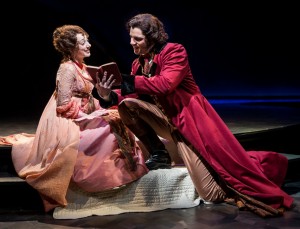 These attractive opposites fuel a warmly winning musical, a new work commissioned by Chicago Shakespeare Theater from Tony-nominated composer Paul Gordon (creator of the 2000 Broadway offering Jane Eyre). Happily, unlike recent musicalizations, Gordon’s 24 seemingly familiar songs, quicksilver lyrics and efficient book speed rather than slow down a clearly told 145-minute tale. They refuse to belabor the obvious or gild the lily and serve the characters as well as the plot. It’s all that Austen acolytes could wish, blending the sensitive and the sensible. Director Barbara Gaines shapes the courtship comedy with a clever fusion of willing innocence and knowing wisdom.
These attractive opposites fuel a warmly winning musical, a new work commissioned by Chicago Shakespeare Theater from Tony-nominated composer Paul Gordon (creator of the 2000 Broadway offering Jane Eyre). Happily, unlike recent musicalizations, Gordon’s 24 seemingly familiar songs, quicksilver lyrics and efficient book speed rather than slow down a clearly told 145-minute tale. They refuse to belabor the obvious or gild the lily and serve the characters as well as the plot. It’s all that Austen acolytes could wish, blending the sensitive and the sensible. Director Barbara Gaines shapes the courtship comedy with a clever fusion of willing innocence and knowing wisdom.
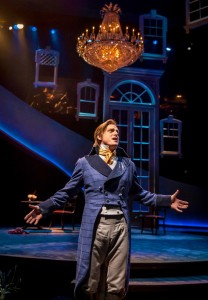 Since this is vintage Austen, Sense and Sensibility is a mating ritual hidden in a drawing-room comedy of errors. The author’s acute anatomy of love and passion’s false equivalents takes center stage: By process of elimination, freeing themselves of bad first impressions and the usual pride and prejudice, the Dashwood sisters discover their dreams in the right soulmates. The first-act ending “Somewhere in Silence” best paints the process–heart and head collaborating in the labor of love.
Since this is vintage Austen, Sense and Sensibility is a mating ritual hidden in a drawing-room comedy of errors. The author’s acute anatomy of love and passion’s false equivalents takes center stage: By process of elimination, freeing themselves of bad first impressions and the usual pride and prejudice, the Dashwood sisters discover their dreams in the right soulmates. The first-act ending “Somewhere in Silence” best paints the process–heart and head collaborating in the labor of love.
As dispassionately as J.D. Salinger, Austen exposes phoniness, a trait far more public than integrity and thus all too agreeable. You “sense” it in the sisters’ grasping sister-in-law Fanny (Tiffany Scott, all airs and few graces). For her, family is a nuisance: She persuades John Dashwood (a malleable David Schlumpf), her husband and their credulous stepbrother, to “free” the girls of any burden of wealth or estate. Suddenly dispossessed, the siblings rely on the charity of the amiable Lord Middleton (Michael Aaron Lindner) and Mrs. Jennings, his late wife’s good-hearted mother (Paula Scrofano, bubbling with erroneous gossip).
Even among unlanded gentry the ladies attract enough admirers to become hostages to their own happiness. Marianne, who prefers hot blood over cold calculation, is impressed but not convulsed by solid but subdued Colonel Brandon (Sean Allan Krill on “the wrong side of five and thirty”). This solitary widower 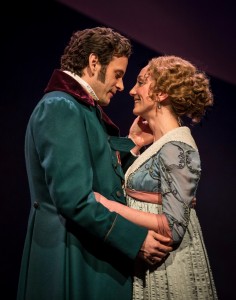 mourns a lost love (“Lydia”) enough to preclude a current one. Marianne is, however, infatuated with a dashing equestrian, the Regency rake Mr. Willoughby (Peter Saide, cavalierly charming).
mourns a lost love (“Lydia”) enough to preclude a current one. Marianne is, however, infatuated with a dashing equestrian, the Regency rake Mr. Willoughby (Peter Saide, cavalierly charming).
Elinor in turn harbors, as Goethe put it, “elective affinities” for Edward Ferrars (handsome Wayne Wilcox), Fanny’s brother and a fond friend. To complicate matters (the course of true love never did run smooth), Edward seems too sincere to be eloquent, which confuses the usually perspicacious Elinor. Worse, affable Edward finds himself pursued by fortune huntress Lucy Steele (Emily Berman, constantly setting her cap or trap). Finally, the shallow heiress Miss Grey (an assiduous Elizabeth Telford) schemes to console ladykiller Willoughby after he’s disinherited by his aunt.
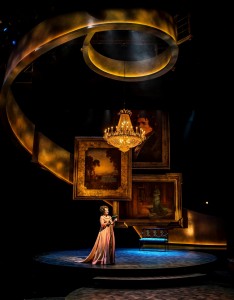 Without too much “settling,” it’s sorted out splendidly by the perhaps protracted ending. Lies will out and love will in. Gordon’s songs are supple showcases for Megan McGinnis’ sprightly and vulnerable Marianne (“There He Is Again”) and Sharon Rietkerk’s exquisitely nuanced Elinor (“Not Even You”). It’s all perfectly pictured too–by Kevin Depinet’s set, a giant steel curlicue suggesting a grand staircase surrounded by Georgian windows and by Susan E. Mickey’s fashionplate finery. (Clothes make the characters.) Harrison McEldowney deftly choreographs the crucial balls (of which this novel contains comparatively few).
Without too much “settling,” it’s sorted out splendidly by the perhaps protracted ending. Lies will out and love will in. Gordon’s songs are supple showcases for Megan McGinnis’ sprightly and vulnerable Marianne (“There He Is Again”) and Sharon Rietkerk’s exquisitely nuanced Elinor (“Not Even You”). It’s all perfectly pictured too–by Kevin Depinet’s set, a giant steel curlicue suggesting a grand staircase surrounded by Georgian windows and by Susan E. Mickey’s fashionplate finery. (Clothes make the characters.) Harrison McEldowney deftly choreographs the crucial balls (of which this novel contains comparatively few).
It’s highly serviceable storytelling, swift enough not to spoil spells Austen has cast for over 200 years. Unlike Chekhov, two sisters are quite enough to catalogue r0mance and keep love real.
photos by Liz Lauren
Sense and Sensibility
Chicago Shakespeare Theater
Courtyard Theater on Navy Pier
ends on June 7, 2015 EXTENDED to June 14, 2015
for tickets, call 312.595.5600 or visit www.Chicagoshakes.com
for info on this and other Chicago Theater, visit www.TheatreinChicago.com

